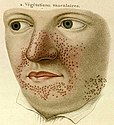The history of tuberous sclerosis (TSC) research spans less than 200 years. Originally regarded as a rare pathological curiosity, TSC is now an important focus of research into tumour formation and suppression. The history of TSC research is commonly divided into four periods. In the late 19th century, notable physicians working in European teaching hospitals first described the cortical and dermatological manifestations (example pictured). At the start of the 20th century, these symptoms were recognised as belonging to a single medical condition. Further organ involvement was discovered, along with a realisation that the condition was highly variable in its severity. The late 20th century saw great improvements in cranial imaging techniques and the discovery of the two genes that cause TSC when mutations form on them: TSC1 and TSC2, which encode for the proteins hamartin and tuberin respectively. Finally, the start of the 21st century saw the beginning of a molecular understanding of the illness, along with possible non-surgical therapeutic treatments. (Full list...)
